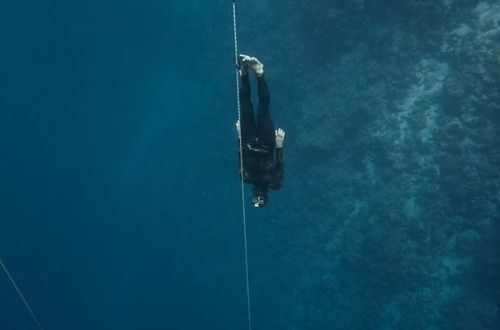Once all the courses of a classic freediving education are over (AIDA 4, SSI 3…) many freedivers (including instructors) want to keep improving their results but don’t necessary have the proper tools to do so : this can lead to some mistakes that can be counterproductive. A very classic and common one is about « Dive Time »…
Introduction
We all heard these kinds of things « you should dive 1 meter per second », « my dive time is good », « you are too slow ».
Those statements are by themself not necessarily false but they led to some absurd behavior where divers are « sprinting » in order to have a « better » dive time.
Only 2 things actually matter, your relaxation and your technique. And of course, there is a deep connection between those elements. Let’s explore the different possibilities and see why in all those scenarios dive time shouldn’t be your concern.
You have a good relaxation with a poor (or improvable) technique:
For sure you will have a « bad » natural dive time but if you focus on just going faster you will end up sprinting, lose a lot of relaxation in the way and you will not really progress. You may then end up with a « good » dive time but with such a poor quality of your dives in terms of technique AND relaxation. So in that case trying to « improve » your dive time makes you regress. What you need is to improve your technique.
You have a good technique but a bad (or improvable) relaxation:
In that scenario, you most likely have a « good » dive time but you are still limited in your progression. I would suggest in that case to analyze how « automatic » is your good technique: if it requires you a lot of focus and concentration to apply everything that you « should » do, you are probably out of practice and you need more repetitions at a shallower depth (where you can repeat plenty of dives in the same session) to get this technique to a fully automatic level. The other possible cause (very connected to the first one) is a poor training approach that puts you in « challenge mode » when you want to accomplish a « deep » dive. If your training is not giving you the confidence you need to do a dive: dive shallower and/or change your training.
Bad (or improvable) technique with bad (or improvable) relaxation:
if you are in this situation, you are very likely to be limited by hypoxia (or in the way to be). Again, you can focus on having a « better » dive time and dive faster to avoid the samba but you will lose even more relaxation on the way (especially with an inefficient technique) and your problem will remain. Once again the focus on the dive time is just absurd.
Good technique with good relaxation:
Not much to say here except « keep going ! ». just don’t forget that a good technique 1 day doesn’t mean it will stay good forever; everyone needs practice! You may still want to include some session to keep it and have it even more « automatic »: it will also help you to reach the next level of relaxation (which can always be improved)
Some precisions
Before finishing, I would like to be a bit more specific with the term relaxation and technique and how to judge if they are « good » or « bad » (it’s not always easy)
Relaxation: Rule number 1 with relaxation is that it can always be better! The problem is that it’s very hard to judge his own level of relaxation because we all have a different scale based on our previous expérience: maybe I consider that for my last dive my relaxation was 10/10 (and therefore couldn’t be any better) but if Guillaume Nery would have dove with the same level of relaxation he would have judged it as a 6/10… Always assume it could be better! In general trust your coach/experience buddy/instructor if they tell you that you could be more relaxed: it is usually something very easy to see with a bit of experience.
Technique: I already mentioned it a bit earlier but apart from being good or improvable, a major part of your technique is your ability to perform it « automatically », without focusing on it: this requires practise practise and practise ! Also, don’t assume that once your technique is « good » it will always stay good: we all lose a bit of it over time and it’s therefore important to regularly practise it. Just as a fun thing: next time you meet a professional musician, ask him what happens if he doesn’t practise his instrument for a whole week! There is no reason the answer you will get doesn’t also apply for freedivers!
Conclusion
Dive time is just a numerical indicator, an indicator that can be useful to judge your technique but like most indicators, if it becomes your goal you will lose the purpose of it. And if for a specific dive you feel you have to choose between technique and relaxation: always choose the relaxation and therefore don’t hesitate to sacrifice the dive time: just make sure to plan enough training so you can reach a good level in BOTH next times you want to perform the same dive.

